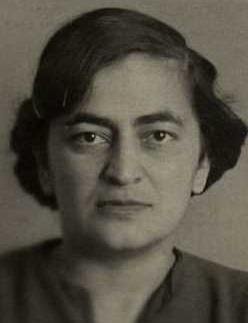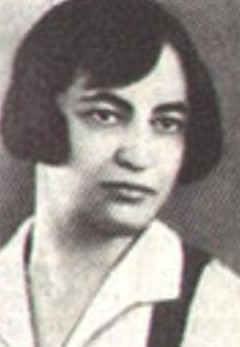Military doctor and partisan, a native of Shusha: Aliya Rustambayova

Aliya Fatulla gizi Rustambayova, a doctor and member of the partisan movement during World War II, was born in 1907 in Shusha in an oil engineer’s family. Her father was one of the founders of the Azerbaijani oil industry, the former chief of the firm of the Azerbaijani millionaire Musa Nagjiyev. He held the position of chief technical director after the occupation of Azerbaijan by Soviet Russia (1920) and was the deputy chief as well as a member of the board of directors of Azneft (The State Union of Azerbaijan Oil Industry in Baku). Her mother was Azerbaijani doctor, a daughter of Karim bey Mehmandarov who was a native of Shusha. He was one of the first leaders of “Difai” in Karabakh (“protection” from the Azerbaijani), a secret anti-terrorist organization which was created in 1906 in order to fight against the Armenian “Dashnaktsutyun” party.
[Azerbaijan Soviet encyclopedia. VIII volume. 1984, p.235]
[Azerbaijan during the Great Patriotic War. 2020, p. 73]
[For motherland. 1965, p. 94]
[Information and address book of the entire Baku as of 1927. 1926, p. 109]
[The USSR. An overview of the five years of nationalization of Azerbaijan’s oil industry over the period 1920-1925. 1925, p. 1]
[Prominent figures of Shusha in the history of migration in Azerbaijan. 2022. p. 154-155]
[M. Mardanov. A. Tahirzade. Azerbaijanis who studied in higher educational institutions until 1920. An encyclopedic reference book. V volume. 2021, p. 126]
While still a toddler, Aliya’s family moved from Shusha to Baku. After graduating from secondary school № 3, Aliya entered the current Azerbaijan Medical University but later she was transferred to the first year of the current First St. Petersburg State Medical University named after academician I.P. Pavlov. After graduating from the university in 1935, she worked at the position of doctor in the construction management hospital in Chirchiq (Uzbekistan) for three years. From 1938, Aliya Rustambayova worked as a Soviet therapist and medical scientist at the Institute of Advanced Medical Training in Moscow, under the guidance of a Soviet therapist, medical scientist and academician of the SSRI Academy of Medical Sciences M. S. Vovsi.
[Azerbaijan Soviet encyclopedia. VIII volume. 1984, p. 235]
[For motherland. 1965, p. 94]
[Prominent figures of Shusha in the history of migration in Azerbaijan. 2022. p. 154]
Aliya served as a military doctor during the Soviet-Finnish war (1939-1940). Like many medical workers, Aliya Rustambayova, who was a doctor of the city clinical hospital named after S. P. Botkin (Moscow) after the Nazi Germany’s attack on the USSR (1941) was sent to the front line. During this period, Aliya served in the medical and sanitary battalion in Volokolamsk, Moscow, and then near Smolensk.
[Azerbaijan Soviet encyclopedia. VIII volume. 1984, p. 235]
[For motherland. 1965, p. 94]
[Prominent figures of Shusha in the history of migration in Azerbaijan. 2022. p. 155]
After the occupation of Smolensk by Germany in October 1941, Aliya Rustambayova got wounded at one of the battles and was captured. Here she was subjected to torture. However, it was stated in the book “For the motherland” (1965) that after the Germans occupied Smolensk Oblast, the military unit where Aliya acted in the enemy’s rear, continued its partisan activities under the German siege.
[M. Alijanov. Participation of Azerbaijani fighters in the partisan movement (1941-1944). 1975, p.227]
[Azerbaijan during the Great Patriotic War. 2020, p. 73]
[For motherland. 1965, p. 96-97]
In early 1942, a group of prisoners of war under the leadership of military doctor Aliya Rustambayova (or not under the leadership, but with the support of partisans) escaped from the German camp (In the book “For the motherland” published in 1965, it was mentioned that Aliya escaped German siege). In February of the same year, she joined the “Dedushka” (“grandfather”) partisan group, which was controlled by Vasiliy Isayevich Vorochenko (the group was named after him because he was the elderly man) and was operating in the forests of the Dorogobuzhsky District of the Smolensk oblast.
[M. Alijanov. Participation of Azerbaijani fighters in the partisan movement (1941-1944). 1975, p. 227]
[Azerbaijan during the Great Patriotic War.2020, p. 73]
[Azerbaijan Soviet encyclopedia. VIII volume. 1984, p. 235]
[For motherland. 1965, p. 97]
[Prominent figures of Shusha in the history of migration in Azerbaijan. 2022. p. 155]
 The book “For the Motherland” indicates that Aliya, being in the forest of Smolensk and surrounded by Germans, wrote the following letter to her friend in Moscow whose name was Teresa Khristoforovna Morgulova. The letter dated April 12, 1942:
The book “For the Motherland” indicates that Aliya, being in the forest of Smolensk and surrounded by Germans, wrote the following letter to her friend in Moscow whose name was Teresa Khristoforovna Morgulova. The letter dated April 12, 1942:
“My dear Tereza! After five months of silence, this letter will probably surprise you. You asked me where I have been all this time. Well, l can boldly answer that I was in real hell as I am now. How many horrors I’ve seen! During this time, I was in the occupied region. I am again next to our partisans. I don’t believe I will be back. It is impossible. Therefore, I do not write letters to my dear ones, despite the opportunity to do it. They got used to the idea that I am not alive. I don’t want them to start worrying about me again. I’m 100 percent sure I’ll die!”
[For motherland. 1965, p. 99]
Aliya Rustambayova became a chief of the medical and sanitary battalion (sanitary section) of the above-mentioned partisan group. She underwent surgical operations in field conditions and saved the lives of wounded partisans.
[Azerbaijan during the Great Patriotic War. 2020, p. 236]
[M. Alijanov. Participation of Azerbaijani fighters in the partisan movement (1941-1944). 1975, p. 227]
[Azerbaijan Soviet encyclopedia. VIII volume. 1984, p. 235]
On June 2, 1942, Aliya Rustambayova wrote the following words to her mother in her last letter:
“I am feeling good. It is true that we do not always have a variety of food products like sugar, tea, oil… I put on galoshes on my bare feet. I made myself a “feminine” blouse from men’s trousers, and a skirt and shirt from the German flag. When escaping from the Germans, I threw away all the clothes I was wearing. My clothes are worn out, everyone dresses like me now.”
[For motherland. 1965, p.100]
“Dedushka” partisan group was surrounded by German troops from the spring of 1942.
Aliya wrote the following in her last letter to her mother:
“Dear Mom! I am again behind the German lines, in the partisan detachment. But things have changed, a more favorable situation has arisen. In the near future, our medical and sanitary battalion will go to the “Big Land” (unoccupied territory of the USSR). We hope to join our units. I really want to get a letter from you…
As soon as you receive my letter, write me two or three letters at once. Maybe one of them will be delivered to me.”
Aliya Rustambayova died in the battle while taking out the wounded partisans from the battlefield in the spring of 1942 (or June 30). However, it was indicated in the party archive of the Smolensk regional committee of the CPSU that Aliya Rustambayova went missing at the end of June 1942. In the “report on irretrievable losses” her missing date was indicated as June of the same year (it was indicated that her name was Rustambayova Aliya Fyodorovna and that everyone called her Alya Fyodorovna). A woman from “Dedushka” partisan group said that Aliya and one of the group commanders were wounded. Other group members were trying to bring them to Moscow by plane. However, the airplane was hit by enemy forces.
[M. Alijanov. Participation of Azerbaijani fighters in the partisan movement (1941-1944). 1975, p. 227]
[Azerbaijan during the Great Patriotic War. 2020, p. 73; 236]
[Information on irretrievable losses. 1942, p. 1]
[For motherland. 1965, p. 94;100;103]
The Azerbaijani poetess Mirvarid Dilbazi dedicated the poem “Partizan Aliya” to Aliya Rustambayova. At that time, Heydar Aliyev, the first secretary of Azerbaijan SSR described her in the following way:
“…I consider the bravery shown by Aliya Rustambayova to be highly characteristic. She was a glorious daughter of Azerbaijan, a military doctor, who fought in one of the partisan groups in Smolensk oblast during the Great Patriotic War…”
[Azerbaijan Soviet encyclopedia. VIII volume. 1984, p. 235]
[M. Alijanov. Participation of Azerbaijani fighters in the partisan movement (1941-1944). 1975, p. 227]
[Azerbaijan. September 9, 1972. p. 8]
Aliya Rustambayova’s photographs, documents, letters (as well as her inkwell and silver pen) are kept in the National Museum of History of Azerbaijan in Baku.
[Prominent figures of Shusha in the history of migration in Azerbaijan. 2022. p., 155]